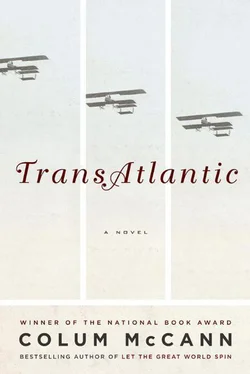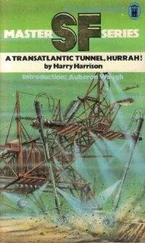— If ye weren’t married, I’d kiss ye.
— Ye wouldn’t come home and clean my kitchen, would y’now, Senator? That’d be some peace process, let me tell ye.
If the canteen is empty he will take a seat in the corner to watch them a moment. He likes their singsong, their bustle. They remind him of the ladies of Maine. The waitresses in the diners. The women in the tollbooths, leaning out their fume-darkened windows.
One of the tea-ladies, Claire Curtain, has a scar on the left side of her forehead in the exact shape of a horseshoe. One afternoon she caught him looking at it, and she blithely told him that it was a result of a bombing — she was on her way to a concert in a bandstand, there was a horse regiment standing nearby, the blast went off, she was walking by along a tree-lined avenue, and she was hit in the head, left with an almost perfect shoe mark on her forehead, and what she remembered most of all was waking, concussed, confused by the sight of horse hooves dangling in the trees.
THE CORRIDORS BUZZ. A faint chanting coming from the crowds outside. The nervous whirl of helicopters overhead. He climbs the rear stairs towards his office, a packet of McVitie’s Digestives tucked under the flap of his suit jacket.
He was driven last summer, by Gerald, out to a farmhouse on the Plantation Road in Derry. He had been at a conference in Coleraine and it was still early: he was not expected back in Belfast until midnight.
He thought at first that he might get Gerald to drive to the sea and take the coast road up around the headlands, but they swung south instead, out into a tangle of backcountry where Gerald had grown up.
Chestnut trees arced the roads. Sheep and cattle paraded in the fields. The light lengthened, stretched the shadows of the hedges and trees. It reminded him of lower Maine: that lush, rained-upon feel.
They drove along a length of carefully planted forest. Gerald pointed out his old school, the fields, the boxing club. It was nine or ten in the evening, but the sky was still bright, birds out over the haystacks.
— You ever been this way, Senator?
He shook his head, no. They crested a small hill and Gerald pulled the car in towards a blue gate. Down below, in the half valley, there were wide brown steppingstones across a river. Enormous oak trees bent to the water. A series of hedgerows slumped towards a distant farmhouse. Rough tractor tracks ran along the riverbank.
Gerald stepped out of the car and leaned against the gate, his chin cupped in his hands. A summertime smoke drifted across the air: a wood fire, an odd thing on such a warm evening.
— I lived over yonder when I was a child, Gerald said.
He pointed to the small farmhouse tucked into the grove of high oak trees.
— My sister’s there now.
He knew what Gerald was asking. No harm, the Senator thought.
It was late in the evening, but he could allow an hour to slip away.
— You should give her a call, Gerald.
— Ach. She’s there with her wee uns. Sure, she’d have a heart attack.
The driver shifted in the silence, as if waiting for another response. Nothing more was said. The light fell slowly across the fields. The Senator reached for the blue gate. When he pushed the bar, the gate groaned and returned. The hasp was rusty. A few blue flakes fell down into the grass.
— Just stretching my legs, he said.
It was odd how uneven the field was: from the gate it had looked perfectly flat and smooth. Clods of earth. Old mounds of manure. Tough, thorny weeds. He stepped towards the enormous stillness of the trees. His good shoes squelched underneath him.
Gerald called from behind him and then he heard the dull closing of a car door, the quiet hum of an engine. He glanced back to see the car crawling along, the roof just visible over the hedgerow.
The car beeped again. He raised his hands in salute, but kept walking through the field. His shadow slanted in the evening light. The northern sky took on colors now, in the distance, the aurora borealis. Reds, greens, purples. He could feel the hem of his trousers against the grass. Small splashes of mud rising up on the back of his heels.
At the river he thought for a moment that he would just turn around and go back the way he came. A loud beeping. No car. He was out of sight. He unloosened his tie. The steppingstones were slick. He peered down into the water. The evening sun fashioned wheels of light on the surface. He thought he saw the dart of minnows. He held on to a tree branch and hunched a little to prepare for the fall, but landed safely on the middle riverstone.
Leaves stirred about him. Odor of moss and reeds and trout. It thrilled him to think there were still moments like this. He looked up through the enormous trees. A ray of sky. He grabbed the long grasses on the far side of the riverbank, pulled himself up. His foot trailed behind him and splashed in the water. A cold swell around his ankle. He ran up the steep bank. The back of his shoe chafed against his heel. In the distance, again, a loud beeping.
Fifty yards from the farmhouse, he saw her in the rear courtyard. At the washing line. Amid gray stonework and a couple of abandoned cars. She was young and aproned. Her hair was stretched into a dark bun at the base of her neck. The washing line ran for thirty yards along the courtyard. White rope between two tall poles. A large straw basket of laundry lodged in against her hip. She was taking giant white bed sheets from the line. Gerald’s sister.
She walked along the length of the clothesline and unclipped the wooden pegs one by one, then put them in her hair.
The sun appeared large on the western horizon now: the bed sheets were magenta.
He heard the house phone ring from a distance: it carried through the air. Gerald’s sister stooped and put the laundry basket on the cobbles. She walked wearily towards the house. She seemed to sigh into the doorway. The ringing stopped.
Moments later he heard a shriek from the house and saw her emerge in a rush of hair and apron and clothes pegs. She ran towards the washing line, and yanked the last of the sheets, looked wildly about.
Gerald’s car was pulling along the laneway, beeping. The Senator stepped out from among the trees. Gerald had rolled down his window and was grinning now.
— Meet the Senator, he said.
— Ach, sure, look at his shoes, she said. What’ve ya done to the poor man?
— My fault entirely, said the Senator.
— I’m Sheila.
— Pleasure to meet you.
— He let you walk through the field?
— Not exactly.
— He’s never had any sense, our Gerry.
She took him by the elbow and guided him towards the house. He cleaned his shoes carefully on the dark mat, then stepped through the scullery and along a tiled corridor in his stockinged feet. A warmth rolled from the large red stove. A smell of recent cooking. Simple crockery on shelves on the wall. In the front room, three quiet children gathered around a television set. A game show. They wore their pajamas. Sheila called out to them. Her voice was high and sharp. The children snapped the television off and stood up to attention, reached out to shake his hand. Freckled. Towheaded. He got down on one knee in front of them and knuckled their shoulders.
He asked their names: Cathal, Anthony, Orla. A sharp absence flooded through him: he showed them a picture of Andrew but they couldn’t comprehend it; they glanced at the picture, said nothing.
He was guided to the kitchen table and he could hear the high whistle of the kettle already going. Gerald sat across the table from him, his hands folded, his face in a generous grin.
Moths crossed the mouth of a lamp on the far side of the room. The wallpaper was patterned with flowers. On the sideboard sat a row of photographs. In several of the photos there was a young man, longhaired, handsome. He seemed to disappear from the photographs: the man reached a certain age and then was gone. A sudden worry flooded the Senator: perhaps Gerald’s brother-in-law was involved with the Troubles somehow? Maybe there had been a murder. Perhaps a conviction somewhere. A shooting. An internment. He felt a rod of fear stiffen his shoulders. Perhaps he had done the wrong thing entirely, walking through this field, entering this farmhouse, taking off his shoes. Perhaps others would claim he had an allegiance. He wasn’t sure now how he could possibly extricate himself. All his time here, a series of careful choices. How simple it was to put a foot wrong.
Читать дальше












